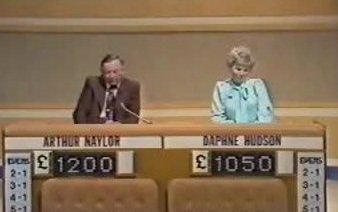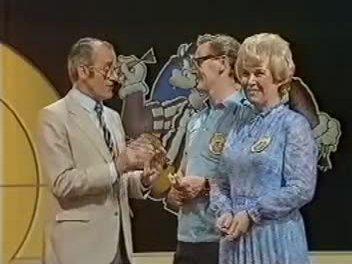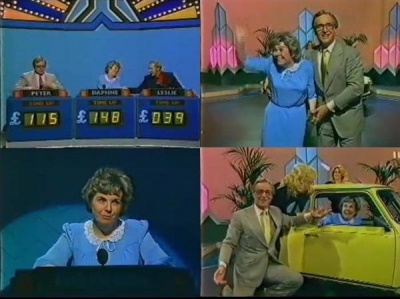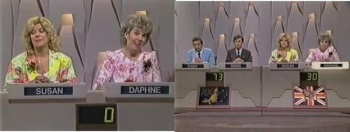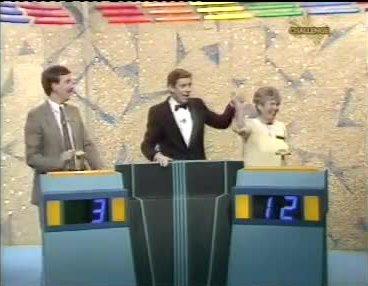Weaver's Week 2014-05-25
Last Week | Weaver's Week Index | Next Week
The following article is not an obituary. Yay!
Daphne Fowler
This week, we're thanking the unknown branch accountant of a bank branch in Avon.
Born in Warwick in 1939, Daphne Bradshaw and her parents moved to Kent after the war. A voracious reader, she spent her pocket money on torch batteries so that she could read books under the bedclothes. She attended Folkestone Grammar School, and started a theology degree at the University of Exeter. She dropped out after two years. In 1960, she married Bernard Hudson, with whom she had five children. When learning to drive, she had to put a mark to remind herself which was her right hand. She did prove to be a bit good at pub skittles, captaining a team called "The Fiddlers" because of their creative approach to adding up the scores.
The Training Opportunites Scheme allowed Daphne to hone her skills for the workforce. By 1975, she was employed as the secretary to the manager of the Nat West bank in Weston Super Mare. She typed up the letters beginning, "We regret to advise you..." The bank held social nights for its staff, one of which was what we'd now know as a pub quiz. Daphne was drafted into the "Brainbank of Bristol" contest on the pretext that she could spell, and at least the team wouldn't lose marks through sloppy errorrs.
The answer sheet was correctly spelt. It was also full of correct answers, thanks in no small part to Daphne Hudson and her flypaper memory. To her existing skittles team, Daphne added a few charity quizzes, something else she was good at.
Daphne's first television appearance came on 22 June 1979, on Winner Takes All. She hadn't actually applied for the show, her sons had written in and applied on her behalf. Daphne quickly made it to the Yorkshire Television studio in Leeds, where Jimmy Tarbuck and The Voice of Geoffrey Wheeler lay in wait.
The format of Winner Takes All was elegant in its simplicity. Contestants were spotted 50 points, and could "bet" 50 points on general knowledge questions with six possible answers. These options were presented as odds on a totaliser, from evens to 10/1. A player who knew the right answer would stake the maximum amount, a player who was less sure might stake less than the maximum. Players could indicate confidence in their accuracy.
Also in the studio was Arthur Naylor, who was a regular on television quizzes of the time. Daphne played a good game, scoring top marks on nine of her ten questions. Arthur played a good game, scoring top marks on nine of his ten questions. Crucially, Arthur dropped points in the heat, Daphne dropped pounds in the final. Her score of £1050 wasn't enough; Arthur had scored £1200, and scooped the show's jackpot. Thanks to the IBA rules, his prize was capped at £1000.
For her next television role, Daphne was joined by her husband Bernard, on Central's Bullseye. Daphne was comfortable in the studio; her husband was not, and the prize gamble was lost. The couple took home £330, lost a canteen of cutlery and a carpet, and agreed that when Daphne next did a television quiz, she flew solo.
From Norwich! It's the quiz of the week! It's the Sale of the Century! Daphne did her homework before appearing with Nicholas Parsons, swotting up on the sort of questions that they loved to ask. "What's the capital of..." and "Who wrote..." Sale of the Century is a quick-fire buzzer quiz, never quicker than in the final stages before the gong. Just from the tone of his voice, we can hear Nicholas Parsons loosen his tie, undo his top button, and sprint through the rapid questions like a dog trying to slip his leash. (Nicholas Parsons is never a dog: he remains completely unflappable, and his diction remains clear even when the world is collapsing around him.)
Part of Daphne's strategy was to get something for her efforts. In the instant sales, she spent £16 on 18 bottles of Scotch. Bingo, that's her daughter's wedding reception sorted out. A picnic hamper proved attractive to a mother of five, but even knowing the result, we were surprised when Daphne spent a further £24 on a portable television. "Perfect for watching Good Morning Britain", suggested the voiceover, forgetting that no-one watched Good Morning Britain. Ever.
No, we were surprised about this because it left Daphne with a lot to do. She was level with another contestant for the game victory, but needed a net fourteen correct answers in the final few minutes if she was to go for the car. With a little help from Nicholas, and sharp buzzing from the other contestants, Daphne achieved that mark with a question to spare. Then it was four of five to win the car, and four of five is exactly what Daphne scored.
From her success, Daphne was invited to a UK All-Stars team, going over to Australia to play an Ashes challenge. It's an away match, so prizes were unlimited but the tactics were different: no-one bought in the instant sales, preferring to keep money for the endgame. Daphne showed her tactical nous: if the other players weren't going to buy things, she would.
Though beaten in the final, Daphne was able to return to Australia for a further international series the following year. Again, Daphne played to her strengths, reading the source encyclopaedias cover to cover, and she took advantage of a peg-back-the-leader gamble to win thousands of dollars. It was enough to buy her house outright.
But we get ahead of ourselves. Daphne had appeared on Brain of Britain in 1983, and after being on the wrong end of a dubious adjudication, returned the following year. At this time, Brain of Britain was strictly organised by region, and Daphne's heat in the South West led to a second round match against players from Wales, and to a semi-final involving the best from Scotland and Ulster. In one of these matches, Daphne came up against Tecwen Whittock, a college lecturer from South Wales. She lost to eventual champion Peter Bates.
A brief spin on Masterteam with Angela Rippon ended in a narrow defeat. And then came Going for Gold. Daphne was already known to the Reg Grundy company, they'd met her on Sale of the Century Australia, and was accepted to the second half of the monster quiz. Shown over 23 weeks, the pan-European quiz was actually recorded over two months in summer 1987, just before transmission started. Later contestants might gain an advantage by going to the recordings, sitting in the studio audience, and watching Henry Kelly host the show.
From her time in the bleachers, Daphne realised that the endgame was crucial: anyone who could memorise brief biographical facts – birth date, death date, places – was at an advantage. She knew that from her time in Australia. Daphne recorded many micro-biographies to cassette tape, listened to them, let them stick in her flypaper memory, and recalled the answers very quickly. Her reward was front row tickets for the Seoul games, and many cherished memories of her husband, who passed away a few months later.
The Grundy connection came up again in 1990, when Daphne Fowler (she'd married her second husband Peter the day before) appeared on the ITV run of Jeopardy!. Five shows, four wins, and that's a very nice honeymoon paid for. She appeared on Runway the following year, a show postponed by war in the Gulf and shown in the autumn, by which time the topic of the champions' round – the USSR – was falling apart into its constituent Eurovision entries. Runway allowed a clear leader to be pegged back, and Daphne did not win this two-against-one contest.
Daphne took early retirement from the bank in 1996, and applied for the following year's Brain of Britain. Again, the regional structure meant she came up against Tecwen Whittock. This time, Daphne was better prepared and came away with the silver salver as Brain of Britain 1997. As champion, she appeared on the end-of-year Masterbrain contest, a hybrid between Brain of Britain and the specialist subjects from Mastermind. Daphne won that contest, and as it hasn't been staged since, has been the reigning Masterbrain champion for sixteen years.
Daphne has made an effort to win the other half, appearing on the Radio 4 edition in 1999; two other players had better specialist rounds and progressed to the next phases. She'd also appeared on The 100% Challenge, special editions pitting quiz champions against each other; and won six editions of 100% Gold. Channel 5 revived Going for Gold in 2000, under the cunning title One to Win; Daphne retained her title, winning ten shows.
Winning Brain of Britain had also qualified her for entry into a special quiz tournament, organised by Gyles Brandreth. "The Champions Challenge Trophy" featured Anne Bradford (crossword expert); Harvey Freeman (Countdown supreme champion); John Harrison (selected by sponsors Whitaker's Almanack); Philip Jones (from the University Challenge champions); Margaret Leather (BBC2 Blockbusters champion); Bill McKaig (Fifteen-to-One maximalist); Irene Thomas (Brain of Britain 1961); and David Webb (Scrabble champion).
When she'd won Brain of Britain, Daphne said that she had two ambitions: to meet Irene Thomas, and to move into a larger house. We have no clue whether the latter happened, the former certainly did. Daphne won the match, and was unavailable to defend her title the following year.
Daphne had appeared on Fifteen-to-One in 1989, and played in a titanic match against Thomas Dyer. Mr. Dyer had been Brain of Britain in 1976, and would win a later series of this quiz. It was no shame for Daphne to be beaten by a stellar opponent; her score of 152 was amongst the highest losing scores of all time. Losing contestants were eventually allowed to reapply, and Daphne returned to the Wandsworth Arena in early 2000. In her first series back, Daphne reached the final.
In her second series, Daphne took on the daily final, and beat it into a pulp. Buzz, right answer. Buzz, right answer. Buzz, right answer. Question, right answer. Question, right answer. Repeat 35 more times. The result: a score of 432 points, the top of the finals board trophy, and massive amounts of adulation. Because Daphne had to win through a second round of some difficulty, we reckon it's the greatest solo performance on Fifteen-to-One ever.
Another top of the finals board trophy followed in the autumn series, with a piffling score of 383. Daphne didn't win those tournaments, but did take both series championships in 2001; four trophies in as many years. She was a regular on Radio 4's X Marks the Spot, once receiving a giveaway clue in the song "All about S(e)oul".
There was never much of a chance that Daphne would be in the hot seat on Who Wants to be a Millionaire. She let it be known to the press how the questions might skew to the masculine (too much science and sport, especially in the qualifying guesstimate questions). There was also the expense of the calls, they do mount up for a couple living on pensions.
"I'd be a very good phone-a-friend for someone," said Daphne in 2001. Within weeks, she was offered £200 by some random stranger for this, turned him down flat, and called up the press. There was no such moral problem when Des O'Connor played for charity, Daphne was his selected friend to phone.
A call from The Guardian in early 2002 led to "The Dream Team", five quizzers who would tour pubs in and around London and take on the best of the capital's brains. The quintet – Daphne was joined by Chris Hughes, Trevor Montague, Gavin Fuller, and David Edwards – emerged with a record of played 5, won 4.
(The article has a cameo appearance for Olav Bjortomt. In a subsequent letter, David Brewis suggested the inclusion of "relative newcomer" Ian Bayley, and "the UK's finest" Kevin Ashman. Having named nine contenders for the top five quizzers of 2002, we'll stop namedropping now.)
From this newspaper article came the seeds of Eggheads, a team of five superbrains. Daphne and Chris were joined by Kevin, Judith Keppel from Millionaire, and the unknown CJ de Mooi. This column has never warmed to Eggheads, we reckon it's too slow and a bit patronising. But we're in the minority, Eggheads has proven to be a hit with viewers from 9 to 99, and Daphne's quiet charm has been an integral part of the show's success.
The greatest error anyone's ever made on Eggheads is to think "old lady with a slight lisp and querulous voice, she'll be no good at the macho man's sport." Daphne is good at sport. Daphne is spectacularly good at sport. Yes, she has often answered questions with a bit of a lift in her voice, as though she's unsure, but that's mostly an act. She's of a certain age, brought up in an era when women weren't expected to be clever, when women had to dumb themselves down so as not to threaten the men. Maybe that era hasn't ended yet.
Throughout her career, Daphne picked her shows carefully. She's a quizzer, not a wordsmith. She remembers facts, turning them into questions and storing them on index cards or later a computer. Daphne never applied for anagram shows such as Catchword and Countdown, though she once said how she would like to appear in Dictionary Corner, and we'd love for that to happen.
Daphne has an innate talent to remember things. She also had the tenacity to hone her talents, to spot the areas where she was weak and improve them. She has tactical skills, brushing up on dates of birth like the Australians do. She has strategic skills, able to make sure she gets something out of every programme. And, most importantly, Daphne has been enjoying herself. She's been doing what she loves to do, and she's been rewarded for her success.
The story isn't quite over, there are two more episodes of Eggheads left to air. Such is the void that it will take two people to replace her – the returning CJ de Mooi and new recruit Lisa Thiel. At 6.30 on Tuesday, Daphne Fowler begins her retirement. We hope it will be a long and blissful time.
This Week and Next
Phase B of Only Connect concluded as the Erstwhile Athletes faced the Software Engineers. Both sides lost their opening round matches, and both are hoping for something better otherwise they won't rise like a phoenix and will be running out the door pursued by Ralph Siegel on the piano. In the contest, both sides are a bit lucky to get bonuses, and there are scratched heads when Postman Pat is alleged to receive letters addresses to "Pat Clifton". Is that canon?
The Erstwhile Athletes make the spot of the round, getting the Grand Slam tennis timekeepers from two clues. It's not enough to give them the lead after Connections, Software Engineers lead 5-4. Neither side speaks a constructed language, neither side is word perfect on the Green Cross Code, and neither side can remember how old Queen Elizabeth is at the moment. Points fly hither and thither, the Software Engineers lead 8-6.
Athletes take Wall 443 "Clergy", a difficult little beast with lots of clerical ranks. It also hides tennis cups, and The Rat Pack, to give up seven points. Wall 444 for the Softengines, and "Whinge" looks more tricky than they find it. Chain ____ and backup supplies are clear, and they have two minutes to work out the final link. They need it, a wonderful little puzzle and a well-deserved Ten Points!
So an 18-13 lead. Not unbeatable, but the Athletes need to take control of the final round. Neither side grabs the round, points are traded roughly equally. The Software Engineers end up winners by 24-19.
A postscript to the Eurovision Song Contest, as the interval act has confused a lot of people. Including us. From the Friday rehearsal, we learn how the plan was to show a seven-minute sequence about The Future of Eurovision. This began with five singers competing in a massive battle round, all singing their own song. After a few minutes of increasingly loud and irritating singing, the dangling microphone rises up towards the ceiling. So that they can continue singing, the performers (aided by a bloke wearing a seagull on his head) dart off stage to get the ladders. Cutting this meant there had to be a reshuffle, and the net result was to introduce the Presenters Stalking The Contestants segment.
We also omitted the Marcel Bezençon Awards, voted by interested parties. Press award to Conchita Wurst, Artistic award from the competitors to the Common Linnets; the Composition award from composers to JB Meijers, Ilse DeLange, Matthew Crosby, Rob Crosby and Jake Etheridge for "Calm After The Storm". This week, confirmation that the BBC wants to "resume its winning ways", and the provisional dates are 12-14-16 May. The countdown continues!
BARB ratings in the week to 11 May.
- The Eurovision Song Contest is the week's biggest show: an average of 8.95m people saw the three-and-a-half hour extravaganza. Britain's Got Talent was done in one hour, and had 8.45m viewers.
- Masterchef was in semi-final week with 5.95m viewers. HIGNFY had 5.1m, and Pointless Celebrities pulled in 4.65m. An edition of Pointless on holiday Monday was seen by 4.2m.
- Great British Menu (2.2m) and The Big Allotment Challenge (2.1m) head up BBC2, with 1.58m for Celebrity Juice and 1.45m for More Talent on ITV2.
- New Come Dine With Me remains below a million (960,000), but Deal or No Deal (890,000) slips ahead of Only Connect (840,000) for the first time in the latter's series. It's also the first time in 2014 that Deal has made a Channel 4 Top 30.
- More success for Eurovision Song Contest on BBC3: 710,000 for Thursday's semi, 610,000 for Tuesday's, and 99,000 on BBC Super Ceefax Red Button Interactive Doodad 301. They should make a series.
Semi-finals week on Britain's Got Talent (ITV, 7.30 Mon-Thu, 7pm Sat), and CBBC (5pm Fri) presents Sam and Mark's Geordie Challenge, which we think is Superteams but done in NEWCASTLE!!!
Photo credits: YTV, Central, Anglia, Reg Grundy, BBC, Regent, 12 Yard. Thanks to readers for correcting our assumption that Daphne won five rounds of Jeopardy!.
To have Weaver's Week emailed to you on publication day, receive our exclusive TV roundup of the game shows in the week ahead, and chat to other ukgameshows.com readers, sign up to our Yahoo! Group.

